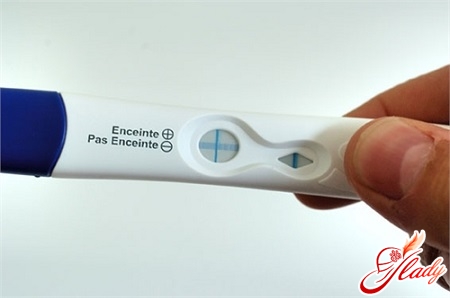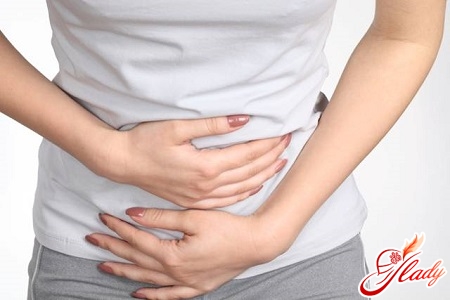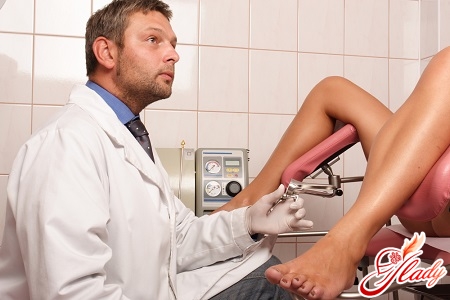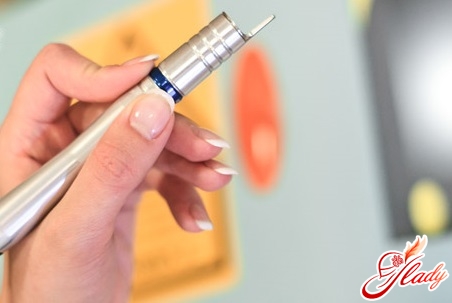 Unfortunately, not always pregnancycomes when it is really desirable and necessary. Of course, a woman should think very carefully about all possible options before making a decision. However, there are times when there is only one way out: abortion. If you made this decision, you need to know exactly what kinds of abortions are. In addition, you must have a clear idea of what complications may be after an abortion. Alas, a very large number of women have absolutely no idea whether abortion is dangerous. For them, the board is an innocent surgical procedure, like the removal of a tooth or the opening of an abscess. It is for this reason that some women refer to the issue of contraception rather irresponsibly, believing that there is nothing terrible in the abortion. However, gynecologists, responding to a question about whether abortions are dangerous, are very categorical: almost not one abortion does not go without complications. Complications can be both pronounced and hidden. In case of hidden complications with their consequences, a woman can face even a few years after the abortion. If a woman approaches the issue of abortion with all seriousness and takes all the necessary actions, she can slightly reduce the risk of complications after an abortion. The most important thing to keep in mind is the fact that the less the pregnancy, the less the harm of abortion for the woman's body. That's why you should not pull to the last with a decision. You can have an abortion in the gynecological department of the medical institution at the place of your registration or in the medical centers specializing in abortion. Remember that the medical institution must necessarily have a license for this type of activity. Before the abortion, you must see the doctor gynecologist, who will accurately determine the duration of pregnancy, assess your overall health and based on the collected data will give direction to the very type of abortion that will bring the least harm to your body. In addition, before you have an abortion, you need to undergo a series of laboratory tests. You should have the following tests with you: a standard gynecological smear, the results of a blood test for RW and HIV infection.
Unfortunately, not always pregnancycomes when it is really desirable and necessary. Of course, a woman should think very carefully about all possible options before making a decision. However, there are times when there is only one way out: abortion. If you made this decision, you need to know exactly what kinds of abortions are. In addition, you must have a clear idea of what complications may be after an abortion. Alas, a very large number of women have absolutely no idea whether abortion is dangerous. For them, the board is an innocent surgical procedure, like the removal of a tooth or the opening of an abscess. It is for this reason that some women refer to the issue of contraception rather irresponsibly, believing that there is nothing terrible in the abortion. However, gynecologists, responding to a question about whether abortions are dangerous, are very categorical: almost not one abortion does not go without complications. Complications can be both pronounced and hidden. In case of hidden complications with their consequences, a woman can face even a few years after the abortion. If a woman approaches the issue of abortion with all seriousness and takes all the necessary actions, she can slightly reduce the risk of complications after an abortion. The most important thing to keep in mind is the fact that the less the pregnancy, the less the harm of abortion for the woman's body. That's why you should not pull to the last with a decision. You can have an abortion in the gynecological department of the medical institution at the place of your registration or in the medical centers specializing in abortion. Remember that the medical institution must necessarily have a license for this type of activity. Before the abortion, you must see the doctor gynecologist, who will accurately determine the duration of pregnancy, assess your overall health and based on the collected data will give direction to the very type of abortion that will bring the least harm to your body. In addition, before you have an abortion, you need to undergo a series of laboratory tests. You should have the following tests with you: a standard gynecological smear, the results of a blood test for RW and HIV infection.
What are the types of abortion?
A few decades more women were availableonly one type of abortion is surgical scraping of the uterine cavity in order to remove the embryo from it. In our days, the choice of methods for aborting a woman is slightly greater. The following are the types of abortion available to a modern woman:
- Medical abortion is atermination of pregnancy, in which there is no surgical intervention in the female body. A woman takes a drug that leads to a miscarriage. Despite the fact that this method at first glance seems absolutely safe, you need to find out from your doctor how dangerous medical abortion is to be fully armed. After all, having the necessary information, you can monitor the state of your body, so do not miss possible complications after medical abortion and will be able to take action. A little lower information is given on how the harm of medical abortion can be caused to women's health.
- Vacuum abortion or, as it is also called, miniabortion. Many women are worried about whether mini-abortion is dangerous. In order to answer it, you need to have an idea of what it is. This type of abortion is performed without expanding the cervix with a special vacuum aspirator, which significantly reduces the complications after a mini-abortion. A special probe is inserted into the uterine cavity, which is connected to the pump. The fetal egg is simply drained from the uterine cavity. Below, we will also talk about possible complications after mini-abortions.
- Surgical scraping of the uterine cavity. The harm of abortion, conducted this way, is extremely high. The essence of this abortion is as follows: the uterus expands with special tools, after which its walls are scraped with a surgical instrument to remove the fetus. How dangerous is an abortion of this type is told a little lower.
How dangerous is abortion?
 A lot of women who decide to have an abortion are askedimagine the question of what consequences after the abortion can expect them. It's not for nothing that there is a proverb "warned - it means armed." However, unfortunately, sometimes it is extremely difficult for a woman to find true information about whether it is dangerous to have an abortion. Supporters of abortion say that abortion is an absolutely safe procedure. Opponents, in response to a question about how dangerous abortion, are beginning to describe significantly exaggerated consequences. The harm brought by medical abortion consists in the following: when taking a drug that interrupts pregnancy, hormonal disorders are possible. This is precisely the answer to the question of what all the same medical abortions are dangerous. Hormonal disorders, in turn, can cause such consequences after a tablet abortion, such as:
A lot of women who decide to have an abortion are askedimagine the question of what consequences after the abortion can expect them. It's not for nothing that there is a proverb "warned - it means armed." However, unfortunately, sometimes it is extremely difficult for a woman to find true information about whether it is dangerous to have an abortion. Supporters of abortion say that abortion is an absolutely safe procedure. Opponents, in response to a question about how dangerous abortion, are beginning to describe significantly exaggerated consequences. The harm brought by medical abortion consists in the following: when taking a drug that interrupts pregnancy, hormonal disorders are possible. This is precisely the answer to the question of what all the same medical abortions are dangerous. Hormonal disorders, in turn, can cause such consequences after a tablet abortion, such as:
- Continued development of pregnancy. In the event that the dosage of the drug was calculated by the doctor incorrectly, the pregnancy will progress. This is the most common complication after medical abortion.
- Another unpleasant consequence aftertableted abortion is the occurrence of uterine bleeding, which requires immediate surgical intervention of a doctor, with the aim of scraping the uterine cavity.
- Be prepared for the fact that you may appearsevere nausea or even vomiting. These phenomena are nothing but consequences after medical abortion. They arise as a result of a sharp change in the hormonal background.
- Another consequence after medicationAbortion can be severe pain in the abdomen. Medical abortion causes miscarriage and, as a consequence, severe contractions of the uterus, which cause painful sensations.
- Elevated blood pressure, as well as allergic reactions, also refers to the negative consequences after tableted abortions.
- Opponents of abortion on the question of whether it is dangerousmedical abortions, lead, for example, cases where after a similar abortion a woman has problems with a hormonal background. There may be problems with the menstrual cycle, subsequent pregnancies.
As already clear, it can not be unequivocally asserted,Whether medical abortion is dangerous. Everything depends on the specific case and features of the female body. This statement is also true for vacuum abortions. It can not be unequivocally answered whether mini-abortions are dangerous. Of course, very much depends on the qualification and level of professionalism of the doctor - gynecologist, who produces abortion. But also do not forget that every woman is absolutely unique and to anticipate the reaction of her body to abortion is almost impossible. A woman who has chosen for herself a similar type of termination of pregnancy, is concerned about whether it is dangerous to do abortion by vacuum. In fact, this type of abortion, of course, can cause certain complications, but their percentage is much lower than surgical abortion by scraping the uterine cavity. The following are the most common complications:
- Incomplete abortion. In this case, some part of the fetal egg remains inside the uterine cavity, resulting in an inflammatory process called the endometritis. In this case, it is necessary to scrape the uterine cavity to remove the remains of the fetal egg.
- Strong pain in the lower abdomen. When they appear, ultrasound should be done to exclude the endometritis. If the endometritis is not found, most likely, painful sensations are caused by intensive contractions of the uterus. In this case, you can alleviate the condition by using antispasmodics.
- Pneumoembolism is the most terrible thing that can be,after abortion by aspiration. In the event that in the uterine cavity is formed not negative, and positive pressure, air can lead to blockage of blood vessels. However, this complication is extremely rare. In addition, in recent years more and more widespread is receiving more modern equipment that technically excludes the possibility of such a situation.
- Damage to the uterine wall. Occurs as a result of too deep penetration of the probe to measure the depth of the uterine cavity. As a rule, speaks about extremely low qualification of the doctor - the gynecologist.
Separately it is necessary to talk about abortion byscraping of the uterine cavity. The answer to the question whether an abortion of this type is harmful is unambiguous: it is very harmful and carries a high risk of developing severe complications. Abortion by curettage is a severe biological blow to the body. It can lead to two types of complications:
- Nearest complications. The closest are the complications that occur the first day after the abortion.
- Delayed complications. Those complications that occur between the day and three years after the abortion.
Talking about how dangerous abortion is,it is impossible not to tell about the most formidable immediate complication, which can lead to a fatal outcome. The operation to remove the embryo from the uterine cavity by scraping is carried out "blindly", practically to the touch. In this regard, the probability of damage to both the cervix and the body of the uterus is very high. Damage to the cervix can result in scarring and, as a result, lead to problems with delivery in subsequent pregnancies. Perforation of the uterine walls exposes the woman's life to a serious threat, since it requires the fastest reaction of the doctor and emergency surgical intervention. If the doctor does not notice the perforation on time, the precious minutes will be lost and the woman may die. These problems are related to the group of immediate complications. No less insidious and delayed complications. The most common complication is various inflammations of the uterus, such as metroendometritis, parametritis, salpingitis and even peritonitis. Such inflammation occurs as a result of infection during an abortion. Severe cases can develop sepsis (blood poisoning), which requires urgent intensive care.
What is the danger of the first abortion?
 The most deliberate approach is to approach the issueabout abortion to those women who want to interrupt the first pregnancy. As a rule, the consequences after the first abortion are much harder and can lead to infertility. But the fact that at the moment the woman decided to interrupt pregnancy does not mean that she will not want to have children in the future. On a woman's question about whether the first abortion is dangerous, doctors do not always answer objectively. Below is a list of the most severe consequences possible after the first abortions.
The most deliberate approach is to approach the issueabout abortion to those women who want to interrupt the first pregnancy. As a rule, the consequences after the first abortion are much harder and can lead to infertility. But the fact that at the moment the woman decided to interrupt pregnancy does not mean that she will not want to have children in the future. On a woman's question about whether the first abortion is dangerous, doctors do not always answer objectively. Below is a list of the most severe consequences possible after the first abortions.
- Chronic diseases of the fallopian tubes and itselfthe uterus is what the first abortion is dangerous for. As a result of chronic diseases, there are adhesions of the fallopian tubes, which can lead to secondary infertility. In addition, spikes increase the risk of an ectopic pregnancy.
- Talking about what the first abortions are dangerous for, it is impossiblenot to mention their effect on subsequent pregnancies, if they do occur. If the cervix has been injured during the abortion, it can lead to the development of ischemicocervical insufficiency. As a result, in subsequent pregnancies a woman may face the problem of miscarriage or with premature birth.
- In addition, very often after an abortion, there are cicatrical changes in the mucous membrane of the uterus. As a result of such pathological changes, the menstrual cycle may be disturbed.
After abortion
In order to at least partially reduce the risk of complications, the following simple requirements must be observed:
- In no case should sexual activity be allowed earlier than 4 weeks after the abortion. Observing this rule, you will be able to protect yourself from possible infection.
- Be sure to timely discharge the bladder. If it is overcrowded, the uterus will not be able to contract with the required intensity.
- Carefully follow the purity of the genitals and change the underwear at least twice a day.
- At the slightest suspicion that everything is in order with your body, you should immediately seek medical help.
Also after an abortion, a woman shouldconsult a doctor for the best method of contraception. We draw your attention to the fact that the staff of our portal does not assess the actions of women from a moral point of view and does not set themselves any agitation tasks. This article is only informative and aims to inform our audience about whether abortions are harmful. We advise you to read:









